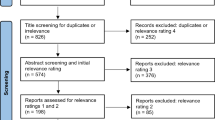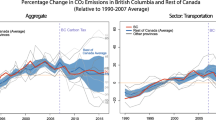Abstract
Taxing internationally mobile factors of production has been dismissed as an inefficient means of raising tax revenue. This paper addresses the question of whether it is efficient to tax capital at source when labor markets and the taxation of lumpsum income suffer from imperfections. Four reasons for taxing capital are identified: (i) institutional constraints rendering any taxation of profit income infeasible; (ii) market power in the demand for labor; (iii) market power in the supply of labor if it increases with the employment of capital; (iv) unemployment benefits that are not tied to net real wages. It is argued that the case for taxing capital is not particularly strong. By reinterpreting capital as energy the results are applicable to the discussion about ecological tax reforms.
Similar content being viewed by others
References
Atkinson, A. B. and J. E. Stiglitz. (1980). Lectures on Public Economics. McGraw-Hill.
Boal, W. M. and M. R. Ransom. (1997). “Monopsony in the Labor Market.” Journal of Economic Literature 35, 86-112.
Boeters, S. and K. Schneider. (1999). “Government versus Union: The Structure of OptimalTaxation in a Unionized Labor Market.” Finanzarchiv 56, 174-187.
Bovenberg, A. L. and R. A. de Mooij. (1994a). “Environmental Levies and Distortionary Taxation.” American Economic Review 84, 1085-1089.
Bovenberg, A. L. and R. A. de Mooij. (1994b). “Environmental Taxes and Labor-Market Distortions.” European Journal of Political Economy 10, 655-683.
Bovenberg, L. and F. van der Ploeg. (1995). “Tax Reform, Structural Unemployment and the Environment.” Fondazione Eni Enrico Mattei Discussion Paper 6/95.
Bucovetsky, S. and J. D. Wilson. (1991). “Tax Competition with Two Tax Instruments.” Regional Science and Urban Economics 21, 333-350.
Dasgupta, P. and J. Stiglitz. (1974). On Optimal Taxation and Public Production.” Review of Economic Studies 39, 87-103.
De Mooij, R. and L. Bovenberg. (1998). “Environmental Taxes, International Capital Mobility and Inefficient Tax Systems: Tax Burden vs. Tax Shifting.” International Tax and Public Finance 5, 7-39.
Diamond, P. A. and J. A. Mirrlees. (1971). “Optimal Taxation and Public Production, I: Production Efficiency, and II: Tax Rules.” American Economic Review 61, 8-27, 261-278.
European Commission. (1997). Proposal for Council directors for restructuring the Community framework for the taxation of energy products, COM (97) 30.
Fuest, C. and B. Huber. (1999). “Tax Coordination and Unemployment.” International Tax and Public Finance 6, 7-26.
Gordon, R. H. (1986). “Taxation of Investment and Savings in a World Economy.” American Economic Review 76, 1086-1102.
Gordon, R. H. (1992). “Can Capital Taxes Survive in Open Economies?” Journal of Finance 47, 1159-1180.
Holmlund B. and A-S. Kolm. (1997). “Environmental Tax Reform in a Small Open Economy with Structural Unemployment.” Working Paper 1997:2, Uppsala University.
Huizinga, H. P. and S. B. Nielsen. (1996). “Capital Income and Profit Taxation with Foreign Ownership of Firms.” Journal of International Economics 42, 149-165.
Koskela, E., R. Schöb and H.-W. Sinn. (1998). “Pollution, Factor Taxation and Unemployment.” International Tax and Public Finance 5, 379-396.
Koskela, E. and R. Schöb. (1999). “Alleviating Unemployment: The Case for Green Tax Reforms.” European Economic Review 43, 1723-1746.
McDonald, I. and R. M. Solow. (1981). “Wage Bargaining and Employment.” American Economic Review 71, 896-908.
Mintz, J. and H. Tulkens. (1996). “Optimality Properties of Alternative Systems of Taxation of Foreign Capital Income.” Journal of Public Economics 60, 373-399.
Mirrlees, J. A. (1972). “On Producer Taxation.” Review of Economic Studies 39, 105-111.
Oswald, A. J. (1985). “The Economic Theory of Trade Unions: An Introductory Survey.” Scandinavian Journal of Economics 87, 160-193.
Pissarides, C. A. (1998). “The Impact of Employment Tax Cuts on Unemployment and Wages; The Role of Unemployment Benefits and Tax Structure.” European Economic Review 42, 155-183.
Richter, W. and K. Schneider. (1999). “Energy Taxation: Reasons for Discriminating in Favor of the Production Sector.” Working Paper, University of Dortmund.
Author information
Authors and Affiliations
Rights and permissions
About this article
Cite this article
Richter, W.F., Schneider, K. Taxing Mobile Capital with Labor Market Imperfections. International Tax and Public Finance 8, 245–262 (2001). https://doi.org/10.1023/A:1011260022155
Issue Date:
DOI: https://doi.org/10.1023/A:1011260022155




